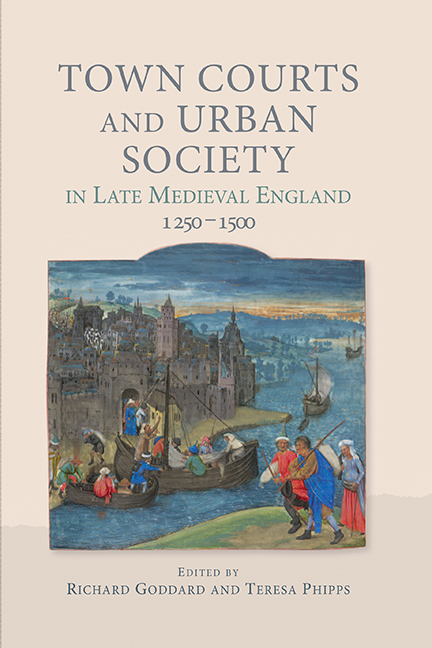Book contents
- Frontmatter
- CONTENTS
- List of Illustrations
- Contributors
- Acknowledgements
- List of Abbreviations
- Introduction
- Jane Laughton: In Memoriam
- 1 Town Courts in Medieval England: An Introduction
- 2 Borough Court Cases as Legal Precedent in English Town Custumals
- 3 The Priest of Nottingham and the Holy Household of Ousegate: Telling Tales in Court
- 4 Female Litigants and the Borough Court: Status and Strategy in the Case of Agnes Halum of Nottingham
- 5 Courts and Urbanisation: Jurisdiction in Late Medieval Seigneurial Boroughs and Towns
- 6 The Business of the Leet Courts in Medieval Norwich, 1288–1391
- 7 The Black Death and the Borough Court: The Changing Pattern of Social and Judicial Representation in Late Medieval Lincoln
- 8 Justice and Jurisdictions in Late Medieval Chester
- 9 Trust: Business Networks and the Borough Court
- 10 Society, Status and the Leet Court in Margery Kempe's Lynn
- Appendix: An Annotated List of Printed or Online Transcriptions and Translations of Medieval Town Courts in Britain to 1500
- Bibliography
- Index
8 - Justice and Jurisdictions in Late Medieval Chester
Published online by Cambridge University Press: 14 September 2019
- Frontmatter
- CONTENTS
- List of Illustrations
- Contributors
- Acknowledgements
- List of Abbreviations
- Introduction
- Jane Laughton: In Memoriam
- 1 Town Courts in Medieval England: An Introduction
- 2 Borough Court Cases as Legal Precedent in English Town Custumals
- 3 The Priest of Nottingham and the Holy Household of Ousegate: Telling Tales in Court
- 4 Female Litigants and the Borough Court: Status and Strategy in the Case of Agnes Halum of Nottingham
- 5 Courts and Urbanisation: Jurisdiction in Late Medieval Seigneurial Boroughs and Towns
- 6 The Business of the Leet Courts in Medieval Norwich, 1288–1391
- 7 The Black Death and the Borough Court: The Changing Pattern of Social and Judicial Representation in Late Medieval Lincoln
- 8 Justice and Jurisdictions in Late Medieval Chester
- 9 Trust: Business Networks and the Borough Court
- 10 Society, Status and the Leet Court in Margery Kempe's Lynn
- Appendix: An Annotated List of Printed or Online Transcriptions and Translations of Medieval Town Courts in Britain to 1500
- Bibliography
- Index
Summary
Chester's medieval court rolls survive in large numbers, meaning that historians can therefore address the key themes of jurisdiction and the operation of justice in the city with some confidence. There are gaps in the record and many rolls are more or less illegible, but we must be grateful for the wealth of material at our disposal, albeit sometimes daunted by its profusion. The rolls of the mayor's Portmote begin in 1295, those of the sheriffs’ Pentice court in 1297, those of the Crownmote in 1316; the first two continue relentlessly until the sixteenth century, and other sources shed more light on the third. It is clearly impossible to cover the entire late medieval period in a short chapter; this study will therefore begin in the 1390s, when new sources document changes in Chester's governmental framework, and conclude in 1506, when the structure of its courts was amended by the Great Charter. It presents a detailed study of two fundamental issues, beginning with an account of how the city's three courts functioned, an analysis of the contrasting attitudes of the officers and litigants to their experiences, and a presentation of reasons for dissatisfaction. This is followed by an enquiry into the conflicts which arose between Chester's civic authorities and the jurisdictions over which they had no control: the county court, the manorial courts held by the bishop, prioress and abbot, the court of the archdeaconry and the court of Dee Mills. The emphasis throughout is on what the court records can tell us about the city and its people – and, although the focus is on Chester, the findings reveal much about attitudes to and structures of justice across many medieval and early modern towns.
The Organisation and Experience of Justice in Late Medieval Chester
Chester's pre-Conquest hundredal court with its twelve judges (iudices) was recorded in Domesday Book. The probable successor to this court was the Portmote, in existence by 1200; doomsmen (judices or judicatores) provided by particular urban properties were appointed to pronounce on laws and customs. As was true of many medieval towns, an intricate network of courts and officials, each responsible for different aspects of local justice, developed in the city over time.
- Type
- Chapter
- Information
- Publisher: Boydell & BrewerPrint publication year: 2019



